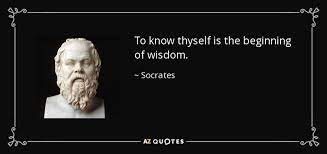A confluence of topics dealing with mental health, substance abuse, health, public health, Social Work, education, politics, the humanities, and spirituality at the micro, mezzo, and macro levels. In short, this blog is devoted to the improvement of the quality of life of human beings in the universe.
Sunday, April 2, 2023
Wednesday, July 27, 2022
Know thyself.
Principle 3: Integral Psychotherapy accepts there are multiple lines or capacities in addition to self-system development. It expects that clients will be developmentally uneven and posits that interventions aimed at different lines can be useful in therapy.
Forman, Mark D.. A Guide to Integral Psychotherapy (SUNY series in Integral Theory) . State University of New York Press. Kindle Edition.
Howard Gardner is often credited with the idea of multiple intelligences. In Integral Philosophy this idea of multiple intelligences are called “lines” of development. Gardner originally describes eight intelligences and then added one more for a total of nine. Integral philosopher, Ken Wilber, describes twelve lines of development. Whatever models you prefer, it can probably be agreed there are a core group of intelligences such as cognitive, athletic, musical, artistic, mechanical, social, emotional, spiritual.
The development of these different kinds of intelligences is uneven with some highly developed and others poorly developed. The question might be asked to what extent is psychotherapy deficit focused and strength focused? A good psychotherapy is both deficit and strength focused. It is not unusual for a psychotherapist to find that a client expresses anguish over failure in one line of development while they excel in another. How important is it for a therapist to take a balanced approach to empower a client who expresses a desire to improve in the areas they are deficient in and amplify and expand the areas they are accomplished in?
We often are asked on employment interviews to identify our strengths and our weaknesses. This type of question brings up the old Greek philosophy dictum, “Know thyself.” and “An unexamined life isn’t worth living.”
One of the major benefits of psychotherapy is to improve one’s degree of self understanding.
Monday, July 25, 2022
Master therapists have a tolerance of ambiguity and abiding curiosity
Increased cognitive complexity, another attribute that appears to be a key feature of strong therapists, is also deeply intertwined with identity development. In their qualitative study of peer-nominated “master therapists,” Jennings and Skovholt (1999) noted that one of the central characteristics of these master therapists is that they “value cognitive complexity and the ambiguity of the human conditions” (p. 6). Relating this finding to the overall literature on therapeutic expertise, they state, “A central tenet in this literature involves an embracing of complexity and reflecting on this complexity in order to grow professionally” (p. 9).
Forman, Mark D.. A Guide to Integral Psychotherapy (SUNY series in Integral Theory) . State University of New York Press. Kindle Edition.
The ability to tolerate ambiguity and an abiding curiosity are hallmark characteristics of good therapists.
This cognitive complexity is the fourth skill of 21 in Cindy Wigglesworth’s model of Spiritual Intelligence. Here is what she writes:
As we progress to the highest levels of development in this skill, we develop the ability to recognize elements of truth in conflicting points of view, embracing and even enjoying paradox and mystery, which are central to mysticism. Holding the tension of opposites can create “third options” which creatively take everyone to a new level.24
Wigglesworth, Cindy. SQ21: The Twenty-One Skills of Spiritual Intelligence (p. 57). SelectBooks, Inc.. Kindle Edition.
Saturday, July 23, 2022
Differentiation and the psychotherapeutic relationship
An additional, key assumption of the clinical-developmental approach is that the therapist's own development is a key aspect of the therapeutic encounter. Each stage of development represents a different way of making meaning about the world and ourselves. If we are trying to empathize with clients at a stage we ourselves are not in or have not been through, we will tend to unconsciously simplify the challenges those clients face and project the features of our worldview onto theirs. Additionally, if we are working with clients at an earlier stage than ourselves, and we are not explicit with ourselves about our relatively greater developmental capacity, we are very likely to place undue expectations on the client or use inappropriate and overly complex interventions. Further development allows us to see our own developmental positions more objectively and to follow “the contours of a client's way of knowing and match it closely” (Kegan, 1994, p. 260). This sets up the best possible conditions for an authentic and healing therapeutic encounter.
Forman, Mark D.. A Guide to Integral Psychotherapy (SUNY series in Integral Theory) . State University of New York Press. Kindle Edition.
In Bowenian Systems theory there is a concept of “differentiation of self” which refers to the level of non anxious autonomous functioning of the individual in the emotional system in which that individual is participating. Referring to this concept of differentiation, the question might be asked whether a psychotherapist at a lower level of differentiation could be helpful to a client at a higher level of differentiation. Put another way, for a helping relationship to be therapeutic it is best if the therapist is at a higher level of differentiation than their clients?
Friday, July 22, 2022
Specialization or common factors?
to point out the modern problem of overspecialization, or the tendency of different theorists and research traditions to stay confined within a very narrow niche or perspective, while tending to ignore what others are doing. Overspecialization manifests itself in many ways in our field and beyond. In psychotherapy, one negative consequence has been the proliferation in the number of available therapeutic modalities—some estimates are as high as 400 different systems (Garfield & Bergin, 1994; Karasu, 1986). Often, people who create new approaches try very hard to distinguish what they are doing from pre-existing approaches without attempting to incorporate or account for the value of what has come before.
Forman, Mark D.. A Guide to Integral Psychotherapy (SUNY series in Integral Theory) . State University of New York Press. Kindle Edition.
Much of psychotherapy has been based on trademarking and branding. CBT, DBT, EMDR, EFT, SFBT, Jungian, Family Systems, Client centered, Humanistic, Existential, Primal scream, etc.
Workshops, certification programs, and other forms of credentialing separate and divide therapists so they can capture a market. However, what we know is that psychotherapy works and is beneficial because of its common factors, not its specialized techniques and models.
The common factors are: 40% of a good outcome are related to external circumstances that have nothing to do with the therapy itself, 30% of a good outcome are related to the quality of the helping relationship, 15% of a good outcome are related to hope and expectancy, and 15% of a good outcome are related to the skills of the therapist.
People come to therapy looking for various things such as “tools” to cope with their stress, and advice about how to resolve certain problems, but the most common thing people are looking for is someone who will listen to them and understand their situation and be there for them. From this listening the person gains a sense of emotional relief and enhanced well being and comfort.
Therapeutic listening is not easy. It takes discipline, skill, wisdom, and above all else an attentive non anxious presence.
Thursday, July 21, 2022
Psychotherapy is not simply personality adjustments.
Put simply, an understanding of the depths of human suffering and anxiety, the paradoxes and contradictions of the individual psyche, and the heights of spiritual knowing are not simply gifted to us through our socialization or upbringing—nor are these understandings the likely outcome of an otherwise sound, conventional training as a clinician. They must be understood first within the self if they are to be fully understood in others. And they cannot be understood in the self of the therapist without time, effort, and strong attention to therapist development. Integral Psychotherapy offers the therapist a map with which to cultivate these insights. It is an approach to therapy that aims to both serve the client and develop the self.
Forman, Mark D.. A Guide to Integral Psychotherapy (SUNY series in Integral Theory) . State University of New York Press. Kindle Edition.
There are four kinds of intelligence: PQ, physical intelligence, IQ, cognitive intelligence, EQ, emotional intelligence, and SQ, spiritual intelligence. A competent psychotherapist should be an expert on all four with an emphasis on the last two, EQ and SQ.
Unfortunately, not many psychotherapists are well trained in SQ and haven’t necessarily mastered the basic skills of SQ, Spiritual intelligence is the basis of good psychotherapy and not simply coaching on techniques and tips for personality adjustments.
Therapist: Know thyself.
An additional feature of Integral Psychotherapy, one just as important as its inclusive theoretical stance, is that it strongly emphasizes the therapist's personal development. Whereas many systems call for therapists to be aware of their own cultural biases and countertransferential tendencies—or to more generally engage in self-care—Integral Psychotherapy goes far beyond this. Specifically, it brings the understanding of the therapist's role into line with constructivist–developmental theory (Kegan, 1994), which is an important, emerging approach to human knowing. This theory posits that, as humans, we actively construct our experience of our world and ourselves. Yet it also suggests that the depth and comprehensiveness of the reality we construct is set or limited by our individual development. This idea has deep implications for a therapist who wants to understand the full range of human experience.
Forman, Mark D.. A Guide to Integral Psychotherapy (SUNY series in Integral Theory) . State University of New York Press. Kindle Edition.
What are the tools of the psychotherapist? A carpenter has a hammer and saw, a seamstress or tailor their needle and thread, an accountant their spreadsheets, and what is the main tool of the psychotherapist? Their personality.
A psychotherapist must use their personality in a purposeful and deliberate way to help their clients meet their goals.
What activities and experiences help the psychotherapist become more self aware so they can use their personality purposefully?
Cultivating wisdom
Often, if we are honest, it is precisely our theory of therapy itself that limits our ability to understand the client.
Forman, Mark D.. A Guide to Integral Psychotherapy (SUNY series in Integral Theory) . State University of New York Press. Kindle Edition.
As therapists we need theories to understand the problems which clients present to us. To be well trained in a certain theory or technique is the basis for many workshops, CE classes, and certifications. However, when the only tool in your tool box is a hammer, everything starts looking like a nail.
I asked a colleague one time what he thought the most important quality was in a good therapist and he said, “Wisdom.” Having my BA in Philosophy I felt a warm glow with this answer.
I have spent my career reflecting on how one cultivates wisdom?






